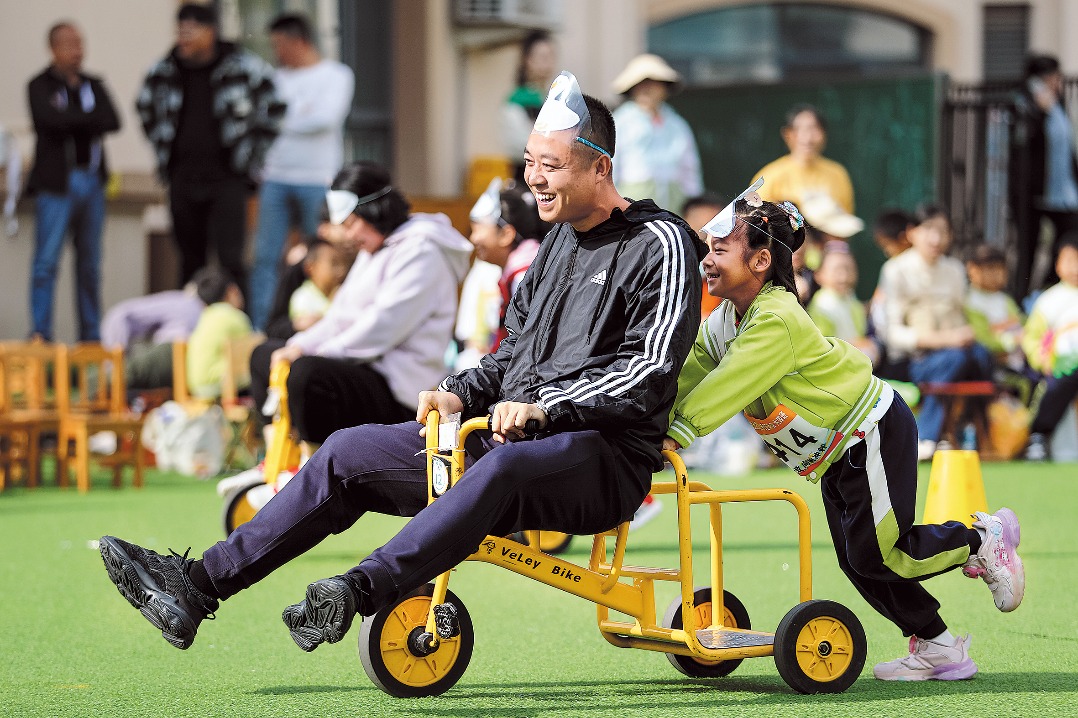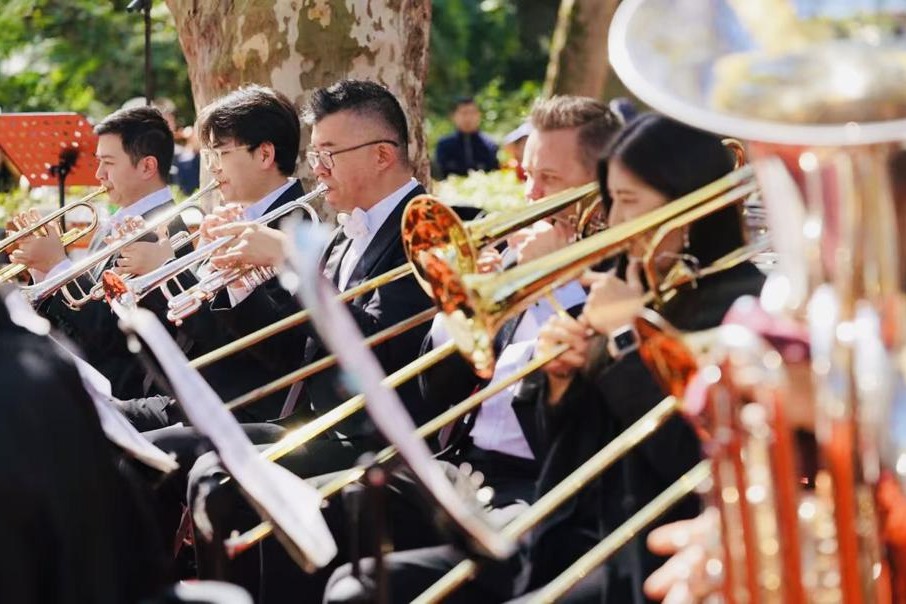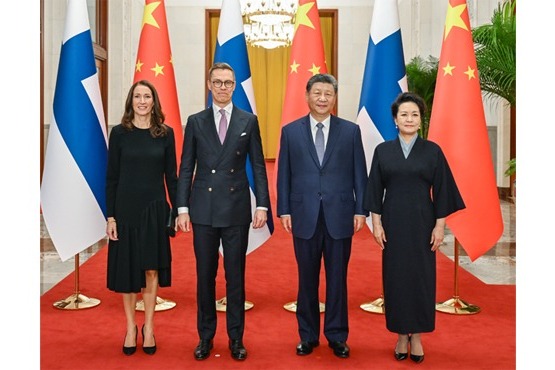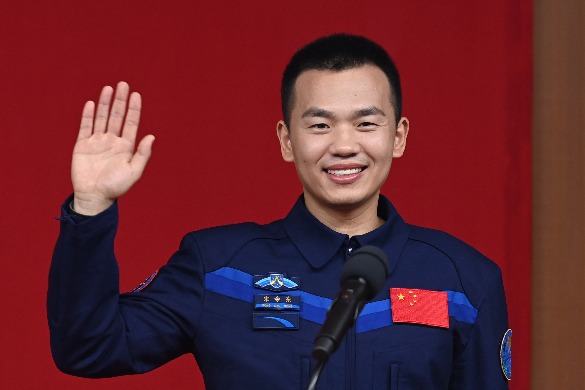Xinjiang women take giant steps for progress
Obstetrician, police officer and technician working for region's brighter future

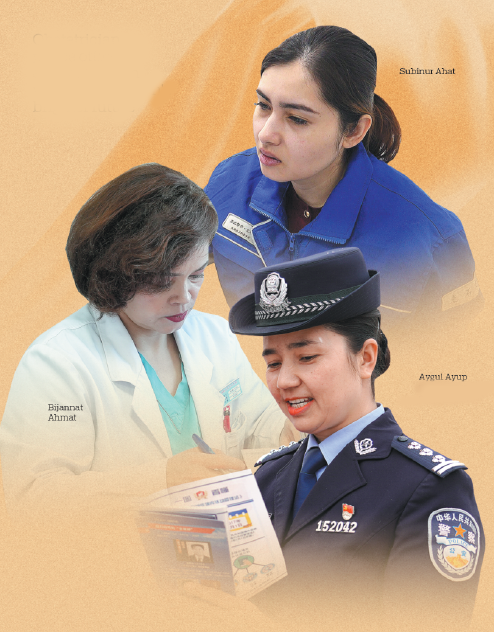
Treating patients like family
Bijannat Ahmat, obstetrician
"Her body was as purple as an eggplant and she had convulsions. Her oxygen saturation was as low as 70 percent. And the fetal heart could barely be heard."
Bijannat Ahmat, 48, an obstetrician in Qira county, Hotan prefecture, Xinjiang Uygur autonomous region, was recalling the urgency of the situation in 2022 when a pregnant patient showed symptoms of amniotic fluid embolism, an often fatal condition.
Doctors at Qira County People's Hospital quickly initiated emergency procedures to save the woman. Her blood pressure had dropped sharply and she had fallen unconscious.
"She was dying. I was about to cry, feeling like there was nothing I could do," Bijannat said. After five hours of medical attention and surgery, the woman was saved, but her baby died. The patient's womb was removed and she received a full blood transfusion.
For such a potentially fatal condition, it was a near miracle the woman was saved at a county-level hospital. "The patient is a mother of two children. If she had died, the family would be broken," Bijannat said.
Over the past two decades, she has dealt with numerous emergencies, saving women's lives and welcoming newborns into the world.
The county has a population of 160,000, and every month about 90 pregnant women give birth at the hospital. The average age of these women is 25, with about half of them having their first child, Bijannat said.
"I tell our doctors to treat every pregnant woman as their own sister, to make sure she can be discharged from hospital in good health," she said. "Delivering a baby is a natural process, and what we do is assist them."
Bijannat has been promoted to chief of the hospital's obstetrics and gynecology department due to her medical skills and contribution to women's health. In October, she was further promoted to vice-president of the hospital.
A rescue center for critically-ill pregnant women has been opened at the hospital under Bijannat's watch.
Through her suggestions, the hospital has also implemented a system to send physicians to township health centers one day a week to give medical treatment, while department heads are sent to do mentoring two days a week.
She is also working to open a postpartum recovery center, and trying to introduce pelvic floor reconstruction surgery to help women.
"Bijannat is a highly professional and experienced doctor, not only proficient in medical skills, but also with high medical ethics," Gu Jinfeng, a doctor at the hospital, told Hotan Integrated Media Center in an interview. "She is quite strict in regard to our daily work, explaining each operation and surgery step by step."
Bijannat, who studied medicine at Shihezi University in Xinjiang, said obstetrics and gynecology was her first choice. She added that she enjoys performing surgery, as it is a delicate operation that can finally solve a problem.
Over the past five years, no maternal deaths have been recorded at Qira County People's Hospital and the neonatal asphyxia rate — which leads to brain damage in infants — has dropped steadily, she said.
Whenever a patient needs urgent treatment, Bijannat is quick to leave her home. She said she wakes up at night if there is no phone call, worrying that she may have missed an emergency call.
When she was breastfeeding her baby, her husband looked after the infant while she worked. Sometimes he waited outside the operating room for two or three hours so Bijannat could feed the child after performing surgery.
Also a deputy to the Xinjiang People's Congress, Bijannat takes queries and complaints from patients and encourages doctors and nurses to offer medical services with patience and a smile.
"Only by regarding patients as your own family can they truly trust you. Whoever comes to me for treatment puts their life in my hands. I must not fail that trust," she said.

Worthy of people's trust
Aygul Ayup, police officer
When police officer Aygul Ayup and her colleagues visited a disabled single mother in Kulbagh village, Aketao county, Xinjiang Uygur autonomous region, she was greeted with indifference bordering on hostility.
Rabigul Bakram has three children and her suffering had made her mistrustful of most people. "It's all formalism. Just take a few photos yourselves," she told the visitors.
The woman's left hand is paralyzed due to her illness. She and her husband are divorced, with the oldest child only 14 years old.
Aygul said she wanted to argue with Rabigul, but she held back. "We must let people know that we are absolutely not engaging in formalism. We are here to listen to everyone's voices and to solve their problems," she said.
Aygul asked about the woman's physical condition and economic situation. Rabigul said: "I'm in poor health. There is no work at home. Life is very difficult."
On hearing about her difficulties, the police officer tidied Rabigul's yard, gave her daily necessities such as rice, flour and oil, and helped organize subsistence allowances for her.
"Since then, whenever she encounters difficulties, she tells me. Now, when I go to her house she treats me as one of her own family," Aygul said. She also helped Rabigul find a job with a stable salary as a security guard at a kindergarten.
Aygul, 44, leaves a lasting impression on every household she visits. She believes sincerity is the only way to gain people's understanding and support.
Over the past 22 years, Aygul, from Aketao Police Bureau, has put her belief into practice and won multiple awards and honors, including an award for outstanding performance in the national public security system in 2022.
During the second session of the 14th Xinjiang People's Congress from late January to early February, Aygul suggested addressing the problems of wolves in pastoral areas and promoting high-quality development of animal husbandry.
"Some 30 to 50 wolves can be elusive. Last year alone, they killed over 700 head of livestock, seriously affecting the confidence of herdsmen," she said. In recent years, with the restoration of grassland ecology, wild animals such as foxes and wolves, which had disappeared, have reappeared on the grasslands, she added.
Since last year, Aygul has traversed most of the grasslands near Charlon town, hearing complaints from herdsmen about their livestock being attacked by wolf packs.
Wolves are a second-level protected species in the country, but Aygul has questioned who will foot the bill for the herdsmen's losses. She hopes her proposal gains the attention of relevant departments, and they formulate strategies to control wolf packs and provide subsidies for pastoral areas.
As a senior police officer and a deputy to Xinjiang People's Congress, Aygul has visited people's homes thousands of times to learn about their difficulties, impart legal knowledge, listen to their questions and offer solutions.
Years ago, when she was about to graduate from high school, she dreamed of being a doctor. However, after her outstanding performance in a physical fitness test at People's Public Security University of China, she became a police officer.
"As I came to understand the work of the police, I gradually realized that it's not just about looking good; it also requires intelligence, skills, courage and a sense of responsibility. I feel that, like doctors, we are all in the business of saving lives and improving people's lives," she said.
In safe, reliable hands
Subinur Ahat, chemical technician
At the age of 32, Subinur Ahat became one of the youngest female chemical technicians at her company. Over the past seven years, she has been promoted despite fierce competition in an industry often regarded as unsuitable for women.
A graduate of China University of Petroleum in Beijing, in 2016 she chose to work at Karamay Petrochemical Co, a branch of China National Petroleum Corp, in her hometown of Karamay, Xinjiang Uygur autonomous region.
To ensure safety standards, the company's oil refining equipment is closely monitored 24 hours a day. For the first four years of her job, Subinur patrolled late at night to check whether pipelines and instruments were functioning properly.
She reported to the office if there was an oil leak, smoke, abnormal readings, device malfunctions or other anomalies. Sometimes she had to climb 10 meters in freezing conditions to inspect equipment with a flashlight. On other occasions she had to figure out a quick solution to problems while protecting herself from hazards such as toxic fumes, fire or explosions.
The outdoor work also required strength. Subinur said she doubted herself in one emergency when she failed to close a valve because it was too heavy. "Real work is so different from learning from textbooks in a class," she said.
But she performed well in theoretical and operational tests and was quick to comprehend the whole process of oil refining. She was transferred to a new post indoors to monitor performance parameters on computer screens.
"You need to be familiar with every parameter so that you can respond to abnormal situations quickly," Subinur said. "We need to keep monitoring the screens while on duty, and report to co-workers when we have to leave for the restroom or go to dinner."
Due to outstanding work performance, she was again promoted two years later. Subinur is now one of two female technicians on a team of 30, supervises other people's work and deals with emergencies. She also checks outdoor equipment twice a day as part of double security measures.
Her position requires her to act quickly and offer solutions to problems within five minutes.
"Though there is more stress at work, I feel a great sense of achievement. Every time I see black crude oil turn into clear, clean, pure oil, I feel that my work to maintain stable and safe production has great meaning," she said.
Last year, she was elected a deputy to Xinjiang People's Congress. She was surprised but honored.
"I got to know more about what's happening in the country, understand how Xinjiang is developing, and have contacted people from different sectors," she said. "I learned that so many people are making efforts to build a beautiful homeland and improve people's lives."
This year's Xinjiang government work report stated that the region will cultivate and strengthen oil and gas production and the processing industry. Subinur proposed encouraging companies to adopt advanced equipment to make production green, low-carbon and intelligent.
Last year, her company improved the efficiency of energy consumption such as hydro power, nitrogen and fuel gas. "We saved over 700,000 yuan ($97,000) in chemical raw material costs and electricity consumption for the entire year," she said.
As mother of a 4-year-old boy and wife of a police officer, she is optimistic about her life and career.
"I want to contribute more to national energy security and promote economic development of Xinjiang," Subinur said.
Contact the writers at [email protected]



















